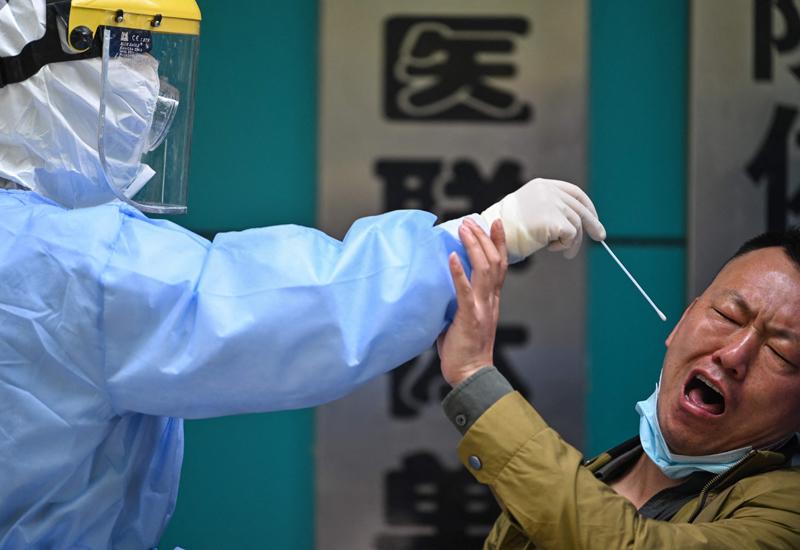 |
| In this file photo taken on April 16, 2020 a man is being tested for the COVID-19 novel coronavirus reacts as a medical worker takes a swab sample in Wuhan in China's central Hubei province. - An international expert mission to Wuhan has concluded that it was very likely that Covid first passed to humans from a bat through an intermediary animal, while all but ruling out a lab incident. AFP |
WASHINGTON March 31 AFP - The United States led a chorus of concern from a group of nations on Tuesday over a WHO-backed report into the origins of the coronavirus in China, with accusations swirling that Beijing failed to give proper access to the investigators.
The US released a statement with 13 of its allies -- Britain, Japan and Australia among them -- saying the inquiry had lacked the data and samples it needed.
World Health Organization chief Tedros Adhanom Ghebreyesus had earlier made a similar criticism, saying the international team he dispatched to Wuhan had found it difficult to get raw data during the mission.
Neither Tedros nor the US-led statement mentioned China directly, but the country's foreign ministry hit back at the perceived criticism from the WHO chief, saying that Beijing had fully demonstrated “its openness, transparency and responsible attitude”.
“To politicize this issue will only severely hinder global cooperation in study of origins, jeopardize anti-pandemic cooperation, and cost more lives,” the ministry said in a statement.
The European Union called the report a “helpful first step” and highlighted “the need for further work”, urging “relevant authorities” to help -- but without naming China.
But Mike Pompeo, the former top US diplomat under Donald Trump, blasted it as a “sham” and part of a “disinformation campaign”, accusing the WHO of being in cahoots with the Chinese Communist Party.
Trump had promoted a theory that the virus could have leaked from a lab in Wuhan, which the WHO-backed experts dismissed in their report. But Tedros stressed that “all hypotheses are open, from what I read from the report... and warrant complete and further studies”.
The pandemic has killed nearly 2.8 million people worldwide since it first emerged in Wuhan in late 2019, with several countries now battling new waves of infection and being forced to take drastic measures.
Italy said on Tuesday it would impose a five-day quarantine on travellers arriving from other EU countries, while Germany will beef up checks along land borders to ensure people arriving have negative Covid tests.
Large numbers of lockdown-weary Germans have nevertheless booked holidays to Spanish tourist island Mallorca.
“I really needed a break, it's hard to work at home without seeing anyone,” said 53-year-old Birgit Leeck on one of the island's golden beaches.
Local authorities in German capital Berlin and Munich again suspended injections with the AstraZeneca jab for under-60s over new reports of rare blood clots among recipients, but called it a “precautionary measure”.
AstraZeneca itself confirmed that it was dubbing its vaccine -- dogged by disputes with Brussels over delivery delays and concerns over the ultra-rare blood clots -- with the official name “Vaxzevria”.
In France, hospitals were under pressure after partial regional shutdowns failed to keep the number of people in intensive care below its second-wave peak.
World leaders on Tuesday called for a new international treaty to better fight future outbreaks and for countries to be ready if -- or when -- another hits.
“Together, we must be better prepared to predict, prevent, detect, assess and effectively respond to pandemics in a highly coordinated fashion,” they urged.
More than 20 countries -- including Germany, France, South Korea and South Africa -- signed up to the plea.
Tedros had earlier urged the world to not waste any time in preparing for the next contagion.
“The time to act is now. The world cannot afford to wait until the pandemic is over to start planning for the next one,” the world health body chief told a virtual press conference.
The expert report on the origins of Covid-19 concluded that the virus probably came from bats and jumped to humans from another animal.
The experts judged it “extremely unlikely” that the virus was grown in a lab, and were also unimpressed by Beijing's theory that the virus did not originate in China at all but was imported in frozen food.
Leave Comments